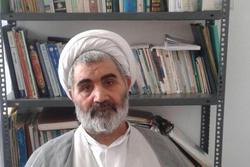 Concerning the part of the revival of Islam illuminating religion and the traditions of the Prophet of Islam (S) in Ashoura uprising, it should be reminisced that Ashoura rising of Imam Hussein (AS) was going to let the religion and tradition of the prophet of Islam (S) remain alive so that people could become acquainted with and follow this original tradition and the practical manner of the Prophet (S) and Imam Ali (AS).
Concerning the part of the revival of Islam illuminating religion and the traditions of the Prophet of Islam (S) in Ashoura uprising, it should be reminisced that Ashoura rising of Imam Hussein (AS) was going to let the religion and tradition of the prophet of Islam (S) remain alive so that people could become acquainted with and follow this original tradition and the practical manner of the Prophet (S) and Imam Ali (AS). RNA - Concerning the part of the revival of Islam illuminating religion and the traditions of the Prophet of Islam (S) in Ashoura uprising, it should be reminisced that Ashoura rising of Imam Hussein (AS) was going to let the religion and tradition of the prophet of Islam (S) remain alive so that people could become acquainted with and follow this original tradition and the practical manner of the Prophet (S) and Imam Ali (AS). Therefore, he pointed to enjoining good, forbidding the wrong and fighting corruptions, sins and diversions.
About the position of economic motivations of Ashoura rising, I should explain that this uprising had no economic motivation, and it was solely aimed at protecting the religion of Islam. The reason suggesting what mentioned is that the flag-holder of Imam Hussein (AS), Hazrat Abulfadl (As), on the day of Ashoura, standing against the enemy to show his loyalty to his own Imam and leader and the whole world, stated, “و الله ان قطعتموا یمینی انی احامی ابدا عن دینی و عن امام صادق الیقینی نجل النبی الطاهر الأمینی” [Certainly, if you sever my hands from my body to make me stop supporting my Imam, I never do this, I will defend the religion and my Imam ever].
Several corruptions, including economic and financial ones, embezzlements and stealing of the house of wealth, happened, however, the one claiming to be caliph and successor of the prophet of Islam (S) and believing to be the ruler of believers, shouldn’t have been such immoral and committed those wrong activities. However, compared to the spiritual corruptions and diversions made to the tradition of the Prophet (S), the number of economic corruptions was very low and thus, it didn’t stand among the main targets of Imam Hussein (AS).
Economic corruptions and plundering of the house of wealth in Yazid’s government
With regard to what mentioned, we can conclude that the rising of Ashoura didn’t derive from any economic motivation, yet, its motivations were mainly spiritual, it aimed at protection, preservation and revival of the religion, and finally at felicity and happiness of people: “إنی لا أری الموت إلاّ سعادةً ولا الحیاةَ مع الظالمین إلا برما” [Certainly, to me, the death is nothing but felicity, and living by the corrupt oppressors is shame].
Regarding the moral corruption and plundering of the house of wealth during Yazid, it is noteworthy that according to some narratives, once a group came to Imam Hussein (AS) to ask his permission on paying allegiance to Yazid, he answered, “الا و ان الدعى بن الدعى قد تركنى بين الاثنین، السلة والذلة، و هيهات له ذلك منى، هيهات منا الذلة”. Indeed, he implicitly answered that he will never pay allegiance to Yazid, as many different corruptions, including adultery, drinking wine and etc. were highly prevalent in the government of Yazid, even Yazdi himself used to drink wine.
Compared to the spiritual corruptions and diversions within the government of Yazid, the number of economic corruptions was very low.
About the embezzlements done during the time of Yazid’s rule, I should add that several corruptions, including economic and financial ones, embezzlements and stealing of the house of wealth, happened, however, the one claiming to be caliph and successor of the prophet of Islam (S) and believing to be the ruler of believers, shouldn’t have been such immoral and committed those wrong acts. However, compared to the spiritual corruptions and diversions to the tradition of the Prophet (S), the number of economic corruptions was very low and thus, it didn’t stand among the main targets of Imam Hussein (AS).
“Even, during the era of the third caliph, economic and financial corruptions were highly rampant, and much money and properties were wrongly and unjustly distributed among some specific people and groups, the number of such corruptions rose with the pass of time, however, moral corruptions, such wrongdoings, vices and sins were not prevalent like the era of Yazid and were not committed under an Islamic coverage. Therefore, Imam Hussein (AS), pointing to the motivations of his rising, didn’t mention economic issues and financial corruptions occurring within the government of Yazid as the main motivations of his uprising.
As a final word, I hope that Heaven may provide us with some more chances of becoming acquainted with the teachings of Ahroura and the culture of Ashoura and mourn on these days.
The End
Rasa News Agency
VoI847/940